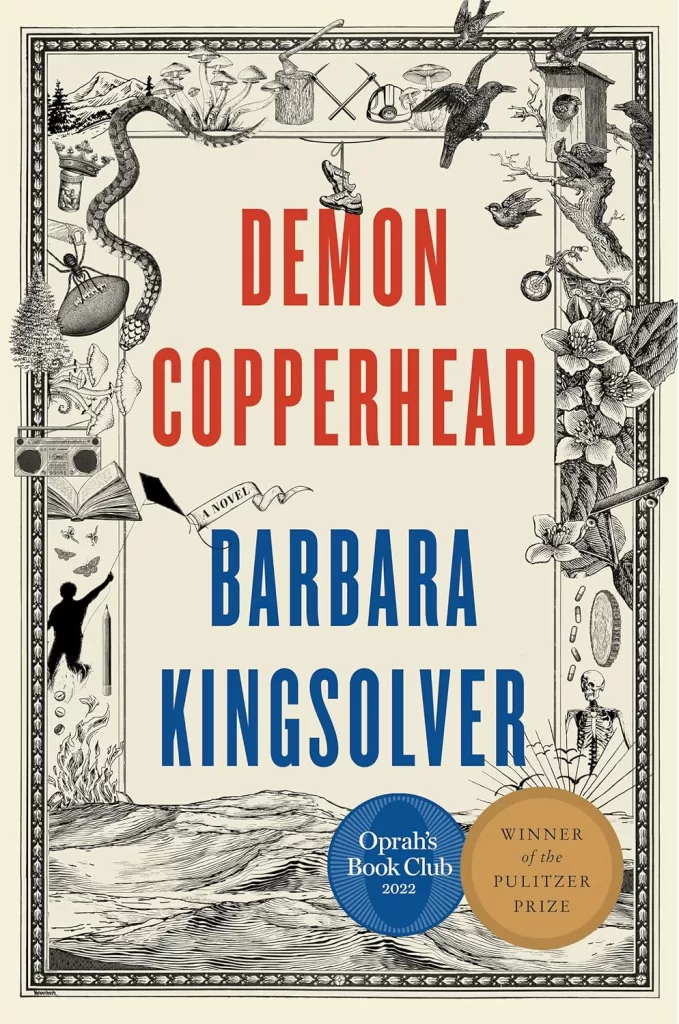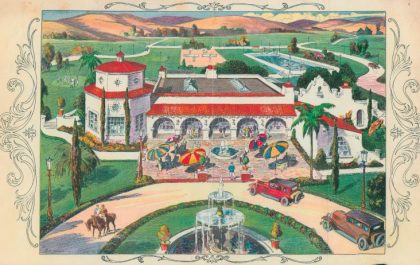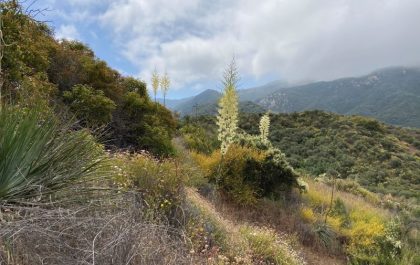
About a month ago while browsing in my local library, I saw Barbara Kingsolver’s latest, Demon Copperhead (2022), among the “staff picks” and brought it home. It didn’t take 50 words to discover that I was on to something special. The title character is our first-person narrator who begins with: “First, I got myself born. A decent crowd was on hand to watch, and they’ve always given me that much: the worst of the job was up to me, my mother being let’s just say out of it.”
With deft wordplay and a finely tuned ear for the language of Appalachia, Kingsolver puts us inside the head of someone who got his start in life in the 1980s on the vinyl floor of a single-wide trailer in the woods somewhere in southwest Virginia while his eighteen year-old mother lay passed out on the same tile with a pharmacy of chemicals coursing through her veins.
Kingsolver’s social commentary is delivered with saucy delight as Demon navigates a life in and out of a broken foster care system where he is hired out as a child laborer; including a tobacco field and a meth lab. Many of the adults in his life are poor, drug addicted, and often criminally inclined. Kingsolver holds special spite for the pharmaceutical industry who actively pandered their wares to an unsuspecting and vulnerable population. The setting here explores the origins of the opioid epidemic that still haunts us today.
I’ve made my way through five of Kingsolver’s novels—thankfully, there are more—and a collection of her short stories. Individually and collectively, these wonderfully crafted tales hit the trifecta of good writing: entertaining, informative, and enlightening.

The Pulitzer Prize-winning author found early success with a pair of novels—The Bean Trees (1988) and Pigs in Heaven (1993)—featuring Taylor Greer, a character who much resembles Kingsolver herself. Born into poverty in rural Kentucky, Taylor somehow escapes the common fate of others in her situation by avoiding pregnancy and then leaving the first chance she gets. Like many of Kingsolver’s predominantly female protagonists, Taylor gets by on her wits, an uncommon sense of independence despite her situation, a boatload of common sense, and an uncanny ability to read people.
On her adventure west in a 1955 Volkswagen Bug that must be parked on a hill in order to jump-start; Taylor eventually makes her way to Tucson, Arizona, after deciding she would live wherever the car broke down. Along the way, while stopping off in the Cherokee Nation of northeastern Oklahoma, a three year-old Indian girl is placed on her passenger seat by a woman who says, “This baby’s got no papers… There isn’t nobody knows it’s alive, or cares. Nobody that matters, like the police or nothing like that.”
Fleeing her fate as a pregnant working woman in rural Kentucky, Taylor finds motherhood afterall. She names the child Turtle because the seriously abused girl has crawled inside her shell and speaks very little. While others see Turtle as somehow mentally deficient, Taylor recognizes that the little one is simply coping with a world that dealt her a really bad first hand; not unlike Taylor.
As it turns out, Taylor has some Cherokee ancestors her “Mama” has told her about. Throughout the two books these three settings—rural Kentucky, the Cherokee Nation, and Tucson, Arizona —reveal things about our country that few of us have experienced.
Commentary in these two great books revolves around the treatment of Native Americans, poverty, ecology, parenting, the changing role of women, and class consciousness; not bad for a story that really gets going in an old Beetle Bug.
In The Lacuna (2009), Kingsolver introduces us to Mexico of 1929 through the eyes, mainly, of Harrison Shepherd, a boy whose Mexican mother has fled Virginia—and his American father—in favor of Enrique, a mysteriously wealthy man who lives on a coastal island. Harrison keeps notebooks that seem at the time a way to converse and think rather than gather into a book. Collected later by an “archivist” who occasionally intervenes with some thoughts of her own, Harrison’s meanderings are used to put together this juxtaposed narrative; one with many different types of “lacuna” or gaps.
The history in this novel sneaks up on the reader. Years later, in Mexico City, Harrison goes to work as a plaster mixer for celebrated Mexican mural painter Diego Rivera while befriending his wife, Frida Kahlo, an acclaimed artist herself. Then Leon Trotsky shows up… yes, that Leon Trotsky… fleeing assassins deployed by Joseph Stalin, and hiding out with Rivera’s help (I somehow missed this day in world history class, so this one cleared some things up for me)/
Harrison eventually becomes secretary to Trotsky as he struggles to clear his name and carry on the Revolution in the Soviet Union that was so violently disrupted by Stalin. The ensuing conversations and ruminations swirl around the Aztecs, the Mexican landscape, European colonialism, communism, the growing tensions in Europe on the eve of World War II, and how history can sometimes turn on the slightest of decisions.
Filling out the trilogy of settings in The Lacuna is Asheville, North Carolina— chosen much as Taylor Greer chose Tucson, the road just ended—and then Washington, DC. The result, in the end, is rather unique commentary on the socio-political machinations that re-defined the world from 1930 to 1950 or so; all put to paper with delightful language and character development.
In yet another wonderful storytelling technique, Kingsolver’s Unsheltered (2018) unfurls two parallel stories set “at the corner of Sixth and Plum in Vineland, New Jersey” in the present day and in the 1870s. In both cases, society seems to be falling apart—as the houses around them are doing the same. I was well into this one—as with The Lacuna—before realizing the degree to which this novel relies heavily upon some very real history; of the previously neglected type. The modern day Willa Knox discovers that her house may have been occupied by someone whose history has yet to be told. Pouring through the local museum’s records offers the hope that, if Willa can confirm the historical significance of her home, this will encourage its preservation as an historical landmark. What she uncovers bends these parallel stories until they converge with a comforting sense of time, space, and hope.
In between the Taylor Greer stories Kingsolver published Homeland and Other Stories (1989). This is an absolutely lyrical collection that introduces the reader to the wide variety of storytelling that has become her hallmark.
Next up for me is Barbara Kingsolver’s The Poisonwood Bible (1998) set in the Belgian Congo with three other novels to follow: Animal Dreams (1990) set in Arizona, Prodigal Summer (2000) focusing on ecological themes and set in rural Virginia, and Flight Behavior (2012) set once again in rural Appalachia.
The intrepid writer has also published essay and poetry collections along with three works of nonfiction. I’ll let you know how it all turns out; or better yet, write to me and let me know what you think about this remarkable person and her diverse body of work.












